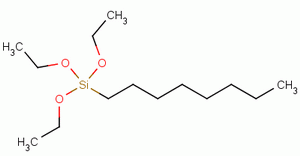MomentiveA-137
-
Post Date:
Apr 08,2025
-
Expiry Date:
Oct 05,2025
-
Detailed Description:
Cas No. :2943-75-1
Specs:98%
Payment Method: L/C,T/T,Western Union
KH-350 is high purity, undiluted N-octyltriethoxy-silane.
Product: Silane coupling agent KH-350
Chemical Name: n-Octyltriethoxysilane;Triethoxyoctylsilane
CAS No.: 2943-75-1
Silane coupling agent KH-350
Product: Silane coupling agent KH-350
Chemical Name: n-Octyltriethoxysilane; Triethoxyoctylsilane
CAS No.: 2943-75-1
Structure formula:
FEATURES
Can be used in the formulation of water repellent products
Produces a hydrophobic treatment that inhibits water absorption
Can improve dispersion of polar fillers in covalent matrices
BENEFITS
Small molecular structure for deep penetration of concrete surfaces
Surface modification can improve compatibility to nonpolar substrates
APPLICATIONS
Commercial buildings
Parking decks/garages
Highways
Bridge structures
Filler modification
TYPICAL PROPERTIES
Color Clear
Purity 98%
Specific Gravity at 25°C (77°F) 0.875
Flash Point, closed cup 63 (>145)
Density °C (°F)73
Volatile Organic Compound (VOC) Content lb/gal 329
Solvent (Thinner)Isopropanol, ethanol or various
DESCRIPTION
KH-350 is high purity, undiluted N-octyltriethoxy-silane. When diluted with an appro-priate solvent, it can be used in the formulation of water repellent products. Upon proper application, the formulated product will penetrate and provide water repellency by chemically reacting with the cementitious substrate. Treated substrates are hydrophobic and retain their original appearance.
KH-350 can also be used to improve the compatibility of mineral fillers or pigments in polyolefins or to ease their dispersion in nonpolar matrices.
KH-350 is a small molecule to allow for deep penetration into the cementitious surface. This material reacts with moisture in the air and in the substrate in the presence of an alkaline or acidic environment to produce hydroxy groups. These hydroxy groups will bond with the substrate and itself to produce a hydrophobic treatment that inhibits water absorption into the substrate. An alkaline environment, such as new concrete, will catalyze the reaction and speed the formation of the hydrophobic surface.
HOW TO USE
Dilution
It can be diluted in solvents such as alcohols, chlorinated solvents, aliphatic solvents and low molecular weight cyclic polydimethylsiloxane Typical dilution levels are 40 percent and 20 percent KH-350 in a solvent.
Blends of the solvents can also be used. The evaporation rate of the diluted material can be modified depending on the type and concentration of the solvent. Select the proper solvent for your application, as some silane/solvent blends may darken the surface. Refer to the manufacturers data sheet for proper handling and disposal of solvents.
NOTE: When using any solvent, always provide adequate ventilation. Follow handling precautions on the solvent container label.
Application
Methods of application include airless sprayer, roller and brush. When a brush or roller is used, repeated applications should be made until the surface remains moist for a few minutes. If an airless sprayer is used, application should continue until the substrate is thoroughly saturated. Sprayers should be fitted with solvent resistant hoses and gaskets.
A test application is necessary on each surface to be treated to ensure compatibility and the desired water repellent result. Surfaces should be free of standing water, surface dirt, dust, oils and other contaminants. Formulated KH-350 may be applied to damp surfaces although dry surfaces are preferred to achieve maximum penetration into the substrate.
Any plants or shrubs should be protected from exposure to the treatment. Any material that should not be exposed to solvents should also be protected.
-
CAS Registry Number:
2943-75-1
-
Synonyms:
;n-Octyl triethoxysilane;Triethoxyoctylsilane;octyltriethoxysilane;(Octyl)-triethoxysilane;
-
Molecular Formula:
C14H32O3Si
-
Molecular Weight:
276.4876
-
Molecular Structure:

-
Hazard Symbols:
 Xi:Irritant;
Xi:Irritant;
-
Risk Codes:
R36/37/38:;
-
Safety Description:
S26:;
S37/39:;
Inquiry

Xi:Irritant;